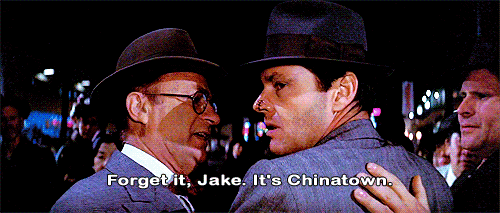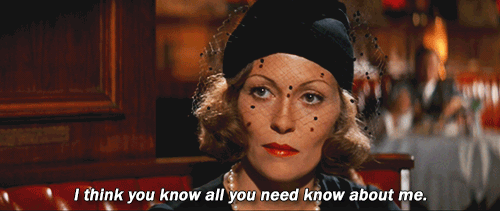Dark alleys, darker secrets, corruption and murder are just another day in Chinatown. This 1974 classic perfectly blends the tragedy of Old Hollywood noir with the gritty edge of the emerging New Hollywood to create one of the most iconic works in all of cinema. At once a chilling portrait of Depression-era America an a damning indictment of 1970's malaise, Chinatown is more relevant than ever. Take a walk on the dark side in Chinatown.

The story begins in 1930's Los Angeles with cop turned private investigator Jake Gittes taking on a new case. In typical noir fashion his potential client is a mysterious woman asking for him to investigate her prominent husband, Hollis Mulwray. While he fails to discover any evidence of Mulwray's supposed affair, he does discover evidence of a scheme to monopolize the drought-beleaguered city's water supply. Eventually Mulwray turns up dead and Gittes learns that the woman who hired him was not actually Mrs. Mulwray. The private detective is then launched on a journey through the darkest corners of Los Angeles and the bleakest depths of the human soul the likes of which still has cinemagoers talking.
Although it is an atmospheric period piece Chinatown offers a scathing critique of America's institutions that continues to resonate today. The film depicts a society devastated by economic depression with a grit worthy of John Steinbeck. Even as it evokes the 1930's, however, it simultaneously echoes the economic and social malaise of the 1970's which in turn eerily parallels today's economic and social upheaval. The film explores the institutional rot that led to the Great Depression and the corruption of those who profited from it with unflinching honesty. In this way, he film serves as an indictment of the excesses of both the 1920's and the 1960's and a reminder of how such excess inevitably leads to eventual devastation. The film delves even deeper into haunting portrait of a nation on the brink through its depiction of political and corporate corruption. The film's portrayal of Noah Cross' elaborate scheme to defraud and exploit the citizens of Los Angeles is damning and its resemblance to the scandals lining today's headlines is nothing short of devastating. The depiction of Cross' personal corruption, while shocking in its time, resonates even more so today in light of modern scandals involving the exploitation of innocence at the hands of society's respected and powerful. Perhaps most resonant of all is the film's bleak conclusion in which Jake resigns himself to his own powerlessness against an all-powerful and thoroughly corrupt system echoing the powerlessness and cynicism that all too many experience when faced with society's eternal corruption. For an unforgettable journey through cinematic history follow Jake through the mean streets of
Chinatown.
The film transports viewers to Depression-era Los Angeles thanks to the work of its iconic cast. Roman Polanski is chillingly sinister in his brief turn as an unnamed local thug whose attack leaves Gittes marked for the remainder of the film. Perry Lopez aptly captures the cynicism of Gittes' former colleague, Sgt. Escobar. John Huston personifies corruption as tycoon Noah Cross. Faye Dunaway turns in one of the most memorable performances of her lengthy career in her by turns intelligent, sultry, and anguished portrayal of the real Evelyn Mulwray. Jack Nicholson is nothing short of iconic in his magnetic turn as reluctant hero Jake. Together, Dunaway and Nicholson share a chemistry that is never less than smoldering.
Hailed by audiences and critics alike, Chinatown is the stuff that the magic of the movies is made of. The script's blend of intricate mystery and aching tragedy makes for some of the most compelling viewing in all of cinema. The star-studded cast are all in tip form as they deliver the performances of their careers. Witness cinematic mastery and join Jake for a visit to Chinatown.




No comments:
Post a Comment